Academiashop
On this page, you find all documents, package deals, and flashcards offered by seller academiashop.
- 136
- 0
- 2
Community
- Followers
- Following
138 items
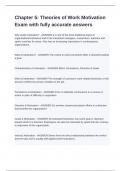
Chapter 5: Theories of Work Motivation Exam with fully accurate answers
Why study motivation? - ANSWER-It is one of the most traditional topics in organizational behaviour and it has interested managers, researchers, teachers and sports coaches for years. Also has an increasing importance in contemporary organizations. What is Motivation? - ANSWER-The extent to which persistent effort is directed towards a goal. Characteristics of motivation - ANSWER-Effort, Persistence, Direction & Goals Effort & Motivation - ANSWER-The strength of a person's work-relat...
- Exam (elaborations)
- • 13 pages •
Why study motivation? - ANSWER-It is one of the most traditional topics in organizational behaviour and it has interested managers, researchers, teachers and sports coaches for years. Also has an increasing importance in contemporary organizations. What is Motivation? - ANSWER-The extent to which persistent effort is directed towards a goal. Characteristics of motivation - ANSWER-Effort, Persistence, Direction & Goals Effort & Motivation - ANSWER-The strength of a person's work-relat...

McClelland's human motivational theory(Exam questions with verified correct answers)
McClelland's three motivations he thinks we all have - ANSWER-a need for achievement a need for affiliation a need for power t or f according to McClelland, the three motivators are learned - ANSWER-t McClelland says that, regardless of our gender, culture, or age, we all have three motivating drivers, and one of these will be our - ANSWER-dominant motivator This dominant motivator is largely dependent on - ANSWER-our culture and life experiences Often likes to work alone. - ...
- Exam (elaborations)
- • 4 pages •
McClelland's three motivations he thinks we all have - ANSWER-a need for achievement a need for affiliation a need for power t or f according to McClelland, the three motivators are learned - ANSWER-t McClelland says that, regardless of our gender, culture, or age, we all have three motivating drivers, and one of these will be our - ANSWER-dominant motivator This dominant motivator is largely dependent on - ANSWER-our culture and life experiences Often likes to work alone. - ...
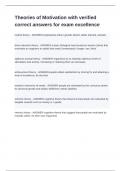
Theories of Motivation with verified correct answers for exam excellence
instinct theory - ANSWER-emphasizes inborn genetic factors rather learned; animals drive reduction theory - ANSWER-a basic biological need produces tension (drive) that motivates an organism to satisfy that need; homeostasis; hunger, sex, thirst optimum arousal theory - ANSWER-organisms try to maintain optimum levels of stimulation and activity, increasing or reducing them as necessary
- Exam (elaborations)
- • 1 pages •
instinct theory - ANSWER-emphasizes inborn genetic factors rather learned; animals drive reduction theory - ANSWER-a basic biological need produces tension (drive) that motivates an organism to satisfy that need; homeostasis; hunger, sex, thirst optimum arousal theory - ANSWER-organisms try to maintain optimum levels of stimulation and activity, increasing or reducing them as necessary

I/O psychology (Motivation), Exam questions with verified, flawless solutions
Theories of Motivation: - ANSWER-Maslow's Hierarchy of Needs, Equity Theory, Procedural Justice, Expectancy Theory, and Goal-Setting Theory Performance - ANSWER-The evaluation of a behavior. Behavior - ANSWER-The product of the motivation process. Reaching new levels on the pyramid - ANSWER-how Maslow's Hierarchy of Needs energizes behavior An individual's needs - ANSWER-how Maslow's Hierarchy of Needs directs behaviors Organizational implications of Maslow's Hierar...
- Exam (elaborations)
- • 5 pages •
Theories of Motivation: - ANSWER-Maslow's Hierarchy of Needs, Equity Theory, Procedural Justice, Expectancy Theory, and Goal-Setting Theory Performance - ANSWER-The evaluation of a behavior. Behavior - ANSWER-The product of the motivation process. Reaching new levels on the pyramid - ANSWER-how Maslow's Hierarchy of Needs energizes behavior An individual's needs - ANSWER-how Maslow's Hierarchy of Needs directs behaviors Organizational implications of Maslow's Hierar...
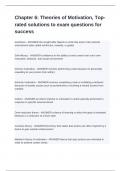
Chapter 6: Theories of Motivation, Top-rated solutions to exam questions for success
Incentives - ANSWER-the sought-after objects or ends that exist in the external environment (also called reinforcers, rewards, or goals) Self-efficacy - ANSWER-confidence in the ability to exert control over one's own motivation, behavior, and social environment Intrinsic motivation - ANSWER-involves performing a task because it's personally rewarding to you (comes from within) Extrinsic motivation - ANSWER-involves completing a task or exhibiting a behavior because of outside cau...
- Exam (elaborations)
- • 2 pages •
Incentives - ANSWER-the sought-after objects or ends that exist in the external environment (also called reinforcers, rewards, or goals) Self-efficacy - ANSWER-confidence in the ability to exert control over one's own motivation, behavior, and social environment Intrinsic motivation - ANSWER-involves performing a task because it's personally rewarding to you (comes from within) Extrinsic motivation - ANSWER-involves completing a task or exhibiting a behavior because of outside cau...
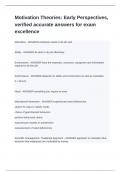
Motivation Theories: Early Perspectives, verified accurate answers for exam excellence
Motivation - ANSWER-employee wants to do job well Ability - ANSWER-be able to do job effectively Environment - ANSWER-have the materials, resources, equipment and information required to do the job Performance - ANSWER-depends on ability and environment as well as motivation P = M*A*E Need - ANSWER-something you require or want Motivational framework - ANSWER-experienced need deficiencies search for ways to satisfy needs choice of goal directed behaviors perform behavioral c...
- Exam (elaborations)
- • 4 pages •
Motivation - ANSWER-employee wants to do job well Ability - ANSWER-be able to do job effectively Environment - ANSWER-have the materials, resources, equipment and information required to do the job Performance - ANSWER-depends on ability and environment as well as motivation P = M*A*E Need - ANSWER-something you require or want Motivational framework - ANSWER-experienced need deficiencies search for ways to satisfy needs choice of goal directed behaviors perform behavioral c...

Chapter 9: Motivation (quiz 3)Exam with verified correct Answers
Organizational Psychology: Definition - ANSWER-Systematic study of dispositional and situational variables that influence the behaviors and experiences of individuals and groups at work. Organizational Psychology: Topics - ANSWER-Motivation, job attitudes, stress and worker well-being, group processes and work teams, leadership, and organizational theory and development Work Motivation: Definition - ANSWER-Drives people to behave in a way that energizes, directs, and sustains their work be...
- Exam (elaborations)
- • 10 pages •
Organizational Psychology: Definition - ANSWER-Systematic study of dispositional and situational variables that influence the behaviors and experiences of individuals and groups at work. Organizational Psychology: Topics - ANSWER-Motivation, job attitudes, stress and worker well-being, group processes and work teams, leadership, and organizational theory and development Work Motivation: Definition - ANSWER-Drives people to behave in a way that energizes, directs, and sustains their work be...

Process Theories of Motivation Exam Questions with 100% Correct Answers
Process Theories - ANSWER-Focus on how motivated behavior occurs Explain how people go about satisfying their needs Motivation is: - ANSWER-The processes that account for an individual's intensity, direction, and persistence of effort toward attaining a goal Three Choices about Effort - ANSWER-1. Intensity: how hard a person tries 2. Direction: toward beneficial goal 3. Persistence: how long a person tries
- Exam (elaborations)
- • 1 pages •
Process Theories - ANSWER-Focus on how motivated behavior occurs Explain how people go about satisfying their needs Motivation is: - ANSWER-The processes that account for an individual's intensity, direction, and persistence of effort toward attaining a goal Three Choices about Effort - ANSWER-1. Intensity: how hard a person tries 2. Direction: toward beneficial goal 3. Persistence: how long a person tries

IB Business Motivation Theories (esxpert-verified solutions for top exam performance)
Maslow - ANSWER-Workers are motivated not just only by money but need to be satisfied with their lower level of needs before they could progress to higher-level needs. Maslow's hierarchy of needs - ANSWER-1. Psychological needs 2. Security needs (safety needs) 3. Social needs (love and belonging needs) 4. Esteem needs (ego needs) 5. Self- actualisation Maslow - Psychological needs - ANSWER-They refer to needs that must be met for people to survive, such as food, water, etc. In busin...
- Exam (elaborations)
- • 5 pages •
Maslow - ANSWER-Workers are motivated not just only by money but need to be satisfied with their lower level of needs before they could progress to higher-level needs. Maslow's hierarchy of needs - ANSWER-1. Psychological needs 2. Security needs (safety needs) 3. Social needs (love and belonging needs) 4. Esteem needs (ego needs) 5. Self- actualisation Maslow - Psychological needs - ANSWER-They refer to needs that must be met for people to survive, such as food, water, etc. In busin...
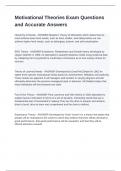
Motivational Theories Exam Questions and Accurate Answers
Hierarchy of Needs - ANSWER-Maslow's Theory of Motivation which states that we must achieve lower level needs, such as food, shelter, and safety before we can achieve higher level needs, such as belonging, esteem, and self-actualization.
- Exam (elaborations)
- • 1 pages •
Hierarchy of Needs - ANSWER-Maslow's Theory of Motivation which states that we must achieve lower level needs, such as food, shelter, and safety before we can achieve higher level needs, such as belonging, esteem, and self-actualization.
